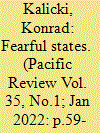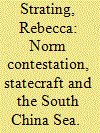|
|
|
Sort Order |
|
|
|
Items / Page
|
|
|
|
|
|
|
| Srl | Item |
| 1 |
ID:
186108


|
|
|
|
|
| Summary/Abstract |
This article examines the ways in which the North Korean regime filters and re-interprets various ‘messages’ from the outside world for its domestic audience through the lens of state-produced literature. In broad strokes, I identify three main types of foreign interactions purported to send a ‘message’ to North Korea – economic sanctions, summit diplomacy and military exercises/fleet movements – and examine how these are treated in North Korean fiction produced by the Korean Writer’s Union, an important arm of the Party’s Propaganda and Agitation Department. Each of the three interaction types represents a formal effort by an outside government – typically the United States or its allies – to send a message to the regime or its people and thereby shape their behavior and/or perception of the outside world. By examining how these ‘messages’ are portrayed in North Korean fiction, we can gain insight into how the regime shapes internal narratives about foreign affairs, as well as what sort of alternative narratives it is most anxious to intercept or disrupt.
|
|
|
|
|
|
|
|
|
|
|
|
|
|
|
|
| 2 |
ID:
186105


|
|
|
|
|
| Summary/Abstract |
This article provides empirical evidence of the emergence of new private governance forms through three case studies: transboundary air pollution, green supply chain, and energy transition in Northeast Asia. This article also refers to private governance theories discussed in the context of global environmental governance. Consistent with the private authority theory, entrepreneurs with vast expertise and capacity to provide useful information and practices have emerged. They allow stakeholders to cooperate in regional environmental sustainability under the conditions of weak or no focal institutions and heterogeneous state preferences. This observation is consistent with the global trend of environmental governance, which is shifting from regulatory-based to goal-setting governance. As global partnership theory suggests, hybrid forms of private governance, including various local- to global-level public–private partnerships, emerge across the cases. However, these forms of governance are still in the embryonic stage, where their functions of private authority are not fully developed. These insights challenge the predominant view on the limited roles of nonstate actors in building regional environmental governance in Northeast Asia as discussed in the existing literature.
|
|
|
|
|
|
|
|
|
|
|
|
|
|
|
|
| 3 |
ID:
186102


|
|
|
|
|
| Summary/Abstract |
After the Fukushima nuclear meltdown, the Angela Merkel government in Germany officially announced its decision to permanently shut down all of its seventeen nuclear reactors. In closer proximity to Fukushima, the Lee Myung-bak government in South Korea expanded its nuclear energy program with specific plans to construct more nuclear reactors in various locations and pursued more export opportunities. It was only in 2017 that the South Korean government, under President Moon Jae-in, announced a gradual phase-out of nuclear power plants in South Korea. What explains the contrasting paths of the German and South Korean nuclear energy programs in the immediate aftermath of the Fukushima nuclear disaster? Why did the same external shock prompt sudden policy reversal in Germany while it took six more years for South Korea to turn its course? While existing studies are helpful in accounting for the rise of particular energy policies, they are insufficient for explaining the causes and specific timing of major policy reversals in the face of external crises. Building upon the literature on political opportunity structures, this article argues that the emergence of new political opportunities and the shift in political framing with respect to nuclear energy caused nuclear phase-out in both countries. A closer look at the two national cases offers an opportunity to delineate the domestic political process of nuclear energy policymaking and evaluate the role of exogenous shocks, such as a major nuclear disaster, in shifting political opportunity structure and reshaping the perceptions of energy security and political risks.
|
|
|
|
|
|
|
|
|
|
|
|
|
|
|
|
| 4 |
ID:
186103


|
|
|
|
|
| Summary/Abstract |
How does the notion of state security inform national approaches to managing cross-border in-migration in the increasingly interconnected but volatile Northeast Asian region? This paper explores this question by focusing on the intermestic politics of labor importation. Specifically, it theorizes the multidimensionality and multifunctionality of security fears that inform Japan’s and Taiwan’s approaches to the admission of low-skilled foreign workers. The paper proposes a comprehensive conceptual framework that explicates these relationships and argues that Northeast Asian labor importation regimes were formed at the intersection of a threefold logic of state security. Whereas economic security acted as an enabling (inclusionary) factor in both Japan and Taiwan and motivated the acceptance of foreign workers, internal security in Japan and external security in Taiwan acted as constraining (exclusionary) factors, which directly and distinctively conditioned the resulting policies. Moreover, ever since their inception in the immediate aftermath of the Cold War, the divergent policy regimes have been interlocked in these economic-internal and economic-external dynamics of state security.
|
|
|
|
|
|
|
|
|
|
|
|
|
|
|
|
| 5 |
ID:
186104


|
|
|
|
|
| Summary/Abstract |
Since 2006, 50 Cuban doctors have worked in Pacific Island countries (PICs), while 250 Pacific islanders have studied medicine at the Latin American School of Medicine in Cuba, nearly doubling the medical workforce in some countries. Although Cuba has pursued an extensive South-South Cooperation (SSC) programme in health around the globe for 60 years, the relatively recent presence of Cuba in the Pacific is intriguing. The programme is based on what Cuba has called the “multiple coincidences” and shared experiences between Cuba and PICs as Small Island Developing States facing common challenges. Proponents argue Cuba’s expertise in providing community-based and human-capital oriented care health care in low-resource environments could provide a suitable model for meeting the health goals and needs of PICs. Moreover, Cuba’s medical cooperation is grounded in an ethics of solidarity and offers a clear example of social justice-oriented south-south cooperation which aims to both address immediate humanitarian need and to transform power structures that limit the accessibility and availability of sustainable health care within partner countries. Yet despite this there has been little research on Cuba’s approach to medical cooperation in the Pacific. This paper addresses this gap, drawing on Maussian gift theory to argue that the Cuban ‘gift of health’ provides much needed capacity in health while building the dignity of both partners. As a theory of solidarity with distinct Pacific roots and which links clearly to the solidarity-based model of Cuban cooperation based on egalitarianism and relationship, gift theory provides an explanation for the presence of Cuba in the Pacific and highlights the importance of equitable relationships and dignity in development partnerships, providing theoretical roots to the idea that there might an alternative to traditional models of aid and development in the region.
|
|
|
|
|
|
|
|
|
|
|
|
|
|
|
|
| 6 |
ID:
186101


|
|
|
|
|
| Summary/Abstract |
Since 2009, the South China Sea disputes have taken on increasing global significance. Situated within a rapidly transforming political landscape, these sovereignty and maritime disputes are totemic of contests over the regional security order and the institutions, rules and laws that support it. The United States has explicitly called upon ‘like-minded’ allies and partners to defend the so-called ‘rules-based order’ against the revisionism of the rising People’s Republic of China, including in the maritime domain. In particular, the South China Sea has become a highly visible arena of ‘normative contestation’, one that raises questions about how norm-preservationist regional powers enact security practices to uphold their preferred vision of order. This study uses Australia as a regional power case study to assess the interests and approaches of a key US ally to normative contestation in the South China Sea. It addresses two questions: first, how does Australia perceive and articulate its interests in the South China Sea? Second, what security practices - diplomatic, legal and operational – can a regional power such as Australia bring to bear in its statecraft? It argues that as a regional power, Australia has adopted a normative approach to upholding maritime order. While Canberra has ratcheted up the rhetoric on the importance of maintaining the ‘rules-based order’ in response to China’s actions in the South China Sea, its security practices have retained a routine, ‘business-as-usual’ quality. This approach is designed to support maritime rules while avoiding economic retaliation from Beijing, reflecting broader strategic dilemmas as a middle-sized state wedged between two great powers. Unpacking the nuances of Australia’s South China Sea statecraft provides important insights for understanding for the preparedness and limitations of regional powers in defending their preferred conception of maritime order.
|
|
|
|
|
|
|
|
|
|
|
|
|
|
|
|
| 7 |
ID:
186107


|
|
|
|
|
| Summary/Abstract |
ASEAN member states have invested substantially in cooperation on humanitarian assistance and disaster relief (HADR). Despite broad support for the idea of ‘localizing’ HADR governance, the rise of regional agency has in practice led to uncertainty and frictions between humanitarian stakeholders. The article makes sense of these tensions by investigating the narratives through which intra- and extraregional agents construct the role of the ASEAN Coordinating Centre for Humanitarian Assistance on Disaster Management (AHA Centre). Based on the assumption that narratives are central legitimating practices when new agents enter a governance arena, it analyzes textual material produced by different humanitarian organizations that operate in Southeast Asia, as well as interviews with representatives from these organizations. Their accounts of the AHA Centre’s role can be grouped into four narratives that are bound up with competing ideas about regional humanitarian order: an affirmative one, a skeptical one, a critical one and a transformative one. The article thus rejects characterizations of regional HADR as a rationally designed ‘architecture’ and instead defines it as a deeply political arena where different conceptions of order are asserted, contested and negotiated.
|
|
|
|
|
|
|
|
|
|
|
|
|
|
|
|
| 8 |
ID:
186106


|
|
|
|
|
| Summary/Abstract |
Technological innovation has emerged as an important site of globalization in recent decades. Yet it is unclear what the future holds for this new form of collaboration, given the spectre of high-tech “decoupling” between the United States and China. This article explores the role that China has come to play in transnational innovation linkages, in an effort to ascertain what is at stake. We find that China has become a key player in some respects, while in others it remains relatively marginal. Moreover, we find that in the arenas where China is most prominent – as a player in brain circulation and as a partner in basic science – China’s participation has had important benefits for other countries, particularly the United States.
|
|
|
|
|
|
|
|
|
|
|
|
|
|
|
|
|
|
|
|
|